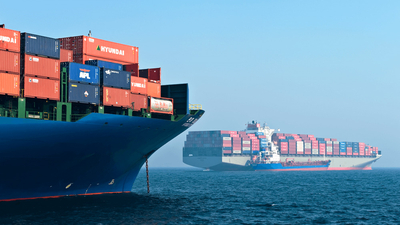VICE PRESIDENT Al Gore used the economic summit in Malaysia to focus attention on the host country's lack of democracy and poor human-rights record. Good for Gore for doing it, even if it did put the nose of Mahathir Mohamad, Malaysia's authoritarian prime minister, out of joint. Gore articulated an important principle: "Democracy confers a stamp of legitimacy that reforms must have in order to be effective." Pro-democracy activists everywhere will be heartened by his words.
 The great protectionist myth is that exports are good and imports are bad — that the more we sell to other countries, the better off we are, while the more they sell to us, the more we need to worry. |
Too bad he wasn't equally principled when it came to the summit's primary focus — trade. Gore and the US should have vigorously promoted free trade across borders as the best way to expand worldwide prosperity, employment, and consumer choice. Instead they mumbled the tired old refrain of protectionism, tariffs, and import quotas.
The Wall Street Journal summarized the Clinton administration's message to the Asia forum: "Boost your ailing economies through trade liberalization, but don't export so much that it hurts US companies and their workers." In other words, invest, produce, and sell — but don't be too successful, because US firms don't want foreign competition. Of course US firms would gladly be rid of domestic competition, too. Would the president tell an American entrepreneur — the head of a new computer company, say — not to attract too many customers lest Compaq and IBM suffer? Of course not. By what right, then, does he say it to entrepreneurs who are Korean or Filipino?
"If we expect the American people to support expanded trade," the president declared last week, "free trade must also be fair trade." That is a familiar soundbite — Pat Buchanan says the same thing — but it is self-contradicting. What Clinton and Buchanan mean by "fair trade" is rules that limit imports from abroad, impose tariffs to drive up their price, or block foreign competition altogether. That is neither free nor fair.
The great protectionist myth is that exports are good and imports are bad, that the more we sell to other countries, the better off we are, while the more they sell to us, the more we need to worry, and that if imports are bad, cheap imports are terrible. Here, for example, is Commerce Secretary William Daley, berating European business leaders: "We alone cannot absorb all of Asia's imports. We will not be the dumping ground for troubled economies. . . . This is a major source of instability. And such instability — caused by boatloads of cheap imports — can lead to political unrest."
And here is how The New York Times, reporting on the same meeting, led its Page 1 story on Nov. 11:
"President Clinton said for the first time today that the United States would not tolerate the 'flooding of our markets' with low-cost goods from Asia and Russia, particularly steel, that are threatening the jobs of American workers."
None of this makes sense.
"Asia" is not "dumping" anything on us. Asian vendors are selling their products to willing American customers. Neither seller nor buyer is acting against his will; both believe themselves better off for the transaction. This isn't aggression, it's commerce. What Daley derides as "boatloads of cheap imports," American consumers welcome as bargains. That low-cost steel "flooding" the US may cost some jobs in the domestic steel industry, but it will create more new jobs in the scores of industries — from construction to cars to cookware — that use steel.
Imports, not exports, are the reason we trade across borders in the first place. Imports are what any nation wants; the only reason we export is to get money to pay for those imports. At the same time, the more others sell to us, the more they are then able to buy from us.
Politicians and journalists speak of trade as if it is a struggle that countries either win or lose. For the past half-century, the planted axiom of trade negotiations has been that nations should relax their import barriers only in exchange for "reciprocity" from other nations. Hey, trading partner, we'll open up our market a little if you open up yours. Conversely, we'll retaliate with an array of trade penalties if you do something that our protectionist lobby — i.e., exporters — deem unfair. (Such as offering us a great price on steel.)
It is time to start thinking of trade not as a battle but as a human right. People should be as free to choose where to buy the products they desire as they are to choose the faith they profess. We do not forbid our citizens to become Muslims just because Muslim countries may forbid their citizens to become Christians. Neither should we prevent Americans from importing Japanese goods on the grounds that the Japanese do not import enough from America.
If tomorrow Congress repealed every trade barrier on our books — every quota, every tariff, every "antidumping" regulation — we would experience a surge of new business, new products, and new wealth. American consumers would have access to better products, at lower prices, than ever. Productivity would zoom upward as competition pushed producers to meet the world's highest standards. The example set by the United States would resonate around the globe. As other nations observed America's new prosperity, they would look for ways to open their markets.
Exports are good, imports are better, and unilateral repeal of trade barriers would be best of all. A pity they didn't hear that from the US delegates in Malaysia.
(Jeff Jacoby is a columnist for The Boston Globe).
-- ## --
Follow Jeff Jacoby on X (aka Twitter).
Discuss his columns on Facebook.
Want to read more? Sign up for "Arguable," Jeff Jacoby's free weekly email newsletter.

